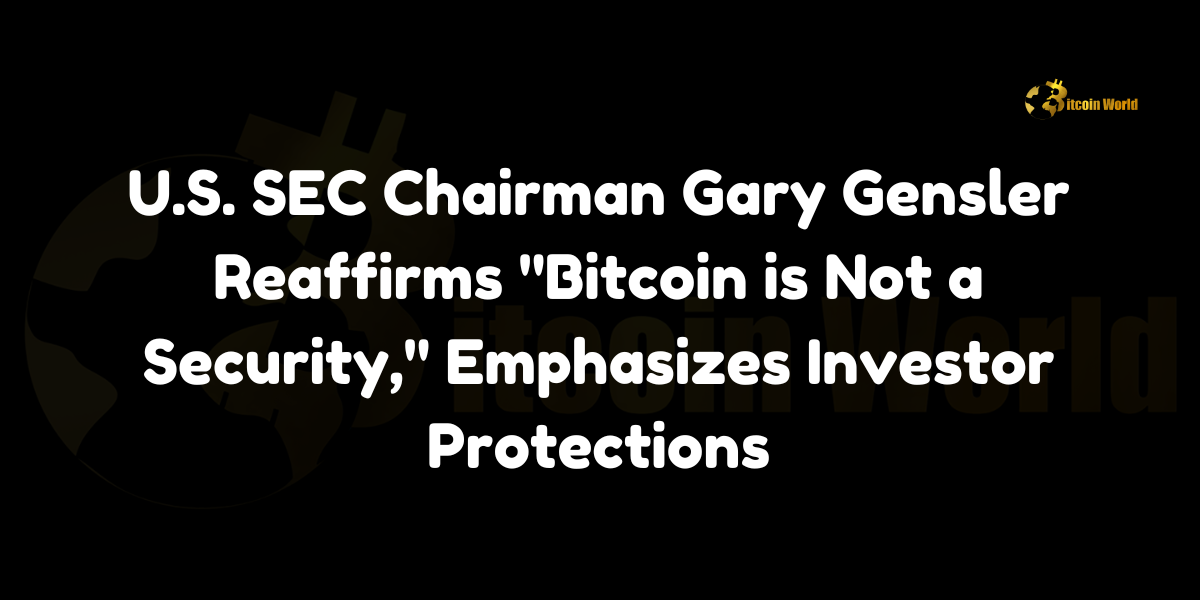SEC Chairman Gary Gensler Reaffirms “Bitcoin is Not a Security,” Emphasizes Investor Protections
In a recent interview with CNBC, Gary Gensler, Chairman of the U.S. Securities and Exchange Commission (SEC), once again confirmed the regulatory agency’s stance that Bitcoin (BTC) is not a security. Gensler’s reaffirmation comes amid ongoing debates surrounding the classification of cryptocurrencies under U.S. securities laws, and it further solidifies the regulatory position on Bitcoin as an asset class distinct from other digital tokens.
During the interview, Gensler emphasized the need for stronger investor protections within the broader cryptocurrency industry, asserting that the market cannot sustain long-term growth and credibility without safeguards in place to protect retail investors. His remarks come at a critical time for the cryptocurrency space, as regulators continue to scrutinize other crypto assets and platforms to determine whether they fall under securities regulations.
Bitcoin’s Regulatory Clarity: Not a Security
Bitcoin’s classification as not a security has long been a point of consensus among U.S. regulators, and Gensler’s latest statement serves to reaffirm this position. As the world’s first and most widely recognized cryptocurrency, Bitcoin operates as a decentralized digital currency, without an identifiable central entity issuing or promoting the asset. This fundamental difference has led regulators to classify Bitcoin as more akin to a commodity, governed by different regulations than securities.
In contrast to Bitcoin, the classification of many other cryptocurrencies remains a matter of debate. Some tokens, particularly those issued via initial coin offerings (ICOs) or decentralized finance (DeFi) projects, may meet the criteria of an investment contract under the Howey Test, which is used by the SEC to determine whether an asset qualifies as a security. In cases where assets are classified as securities, they are subject to a different set of regulatory requirements, including registration and disclosure obligations.
By confirming that Bitcoin is not a security, Gensler draws a clear distinction between Bitcoin and other crypto assets, helping to provide much-needed clarity to the industry regarding regulatory frameworks.
The Importance of Investor Protections in the Crypto Industry
In the interview, Gensler did not stop at reaffirming Bitcoin’s status. He also underscored the importance of investor protections in the wider cryptocurrency market. According to the SEC Chairman, the current state of the crypto industry is not sustainable in the long term without proper safeguards for retail investors.
Gensler pointed out that while Bitcoin itself may not fall under the SEC’s jurisdiction as a security, many other digital assets and the platforms that trade them do. He stressed that these assets must comply with securities laws to ensure that investors are properly informed about the risks and rewards associated with trading crypto assets.
“We have clear securities laws, and these laws were put in place to protect investors,” Gensler said during the interview. “The crypto industry is not going to thrive in the long run if it does not have these investor protections. People need to know the risks they’re taking.”
Implications for the Cryptocurrency Industry
Gensler’s comments reflect the SEC’s ongoing focus on ensuring that the cryptocurrency space operates within the bounds of U.S. securities laws, particularly in relation to tokens that may be classified as securities and the platforms that facilitate their trading. While Bitcoin may be exempt from these regulations, the broader crypto market is facing increasing scrutiny from regulators who are concerned about market transparency, fraud, and investor protection.
By calling for stricter investor safeguards, Gensler is signaling that the SEC will continue to take a proactive approach to regulating the cryptocurrency industry. This could involve further enforcement actions against crypto projects and exchanges that fail to comply with existing securities laws.
The SEC Chairman’s remarks also highlight the challenges faced by crypto platforms that trade a mix of Bitcoin and other digital assets. While Bitcoin may not be classified as a security, other assets on these platforms may fall under securities regulations, necessitating registration and disclosure requirements for platforms that trade them.
Bitcoin’s Role in the Broader Regulatory Landscape
As Bitcoin continues to be recognized as a commodity-like asset, its role in the broader regulatory landscape remains distinct from that of tokens that are more likely to be considered securities. The Commodity Futures Trading Commission (CFTC) oversees Bitcoin futures trading and other derivatives markets, while the SEC primarily focuses on assets that meet the criteria of securities under the Howey Test.
Gensler’s reaffirmation of Bitcoin’s non-security status serves as a reminder that while Bitcoin is largely free from SEC oversight, it does not mean that the broader cryptocurrency market can avoid regulatory scrutiny. The SEC’s jurisdiction over securities means that many crypto assets—especially those issued by companies or platforms promising returns to investors—could be subject to SEC regulation.
Conclusion: A Clear Distinction, but Growing Regulatory Focus
The SEC Chairman’s latest statement provides greater clarity on Bitcoin’s regulatory status, reaffirming that the cryptocurrency is not a security and reinforcing its distinction from other crypto assets. However, Gensler’s call for stronger investor protections highlights the SEC’s broader regulatory agenda for the crypto industry, focusing on safeguarding retail investors and ensuring market transparency.
While Bitcoin remains relatively insulated from the SEC’s regulatory reach, the agency is likely to continue targeting other crypto assets that may be subject to securities laws. For market participants, Gensler’s comments signal that the regulatory environment for cryptocurrencies will continue to evolve, with a focus on bringing greater oversight and accountability to the sector.
Internal Link Reference
For more information, explore our article on Bitcoin’s regulatory framework, where we discuss the evolving legal landscape and its implications for crypto investors.
Disclaimer: The information provided is not trading advice, Bitcoinworld.co.in holds no liability for any investments made based on the information provided on this page. We strongly recommend independent research and/or consultation with a qualified professional before making any investment decisions.




